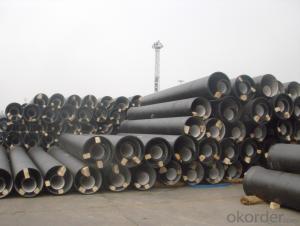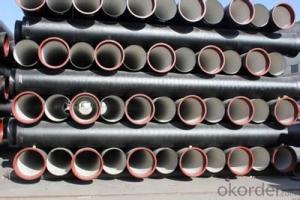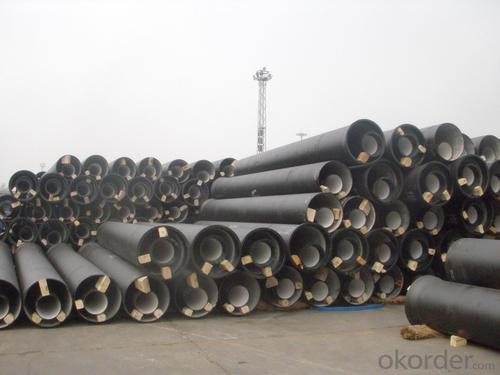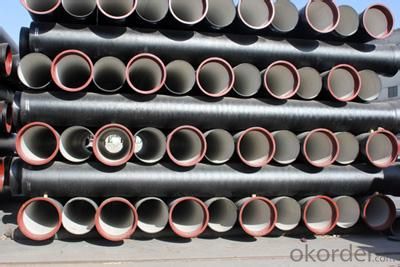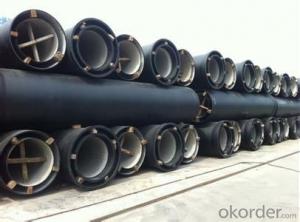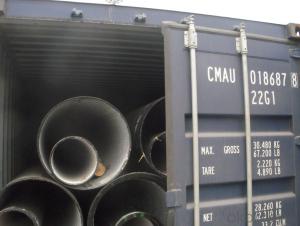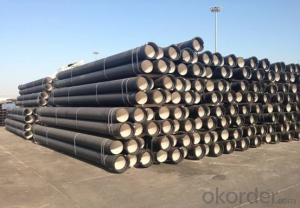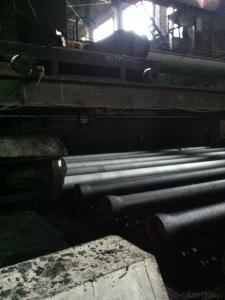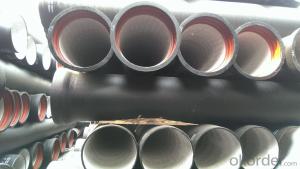DUCTILE IRON PIPES K9 DN125
- Loading Port:
- China Main Port
- Payment Terms:
- TT OR LC
- Min Order Qty:
- -
- Supply Capability:
- -
OKorder Service Pledge
OKorder Financial Service
You Might Also Like
Ductile Iron Cast Pipe is without any defects compare with tradition casting tech, which has many advantages particularly as follow:
(1) High density. In the "vertical upward casting" process, the melt iron of centre liquid column in center crystallizer is continuously feeding for volume shrinkage caused by condensation tube at outer circumference , which lead to be free of shrinkage porosity.
(2) High purity. When melt iron pouring, the mixed impurities such as gas, dross, sand grain which are lighter than melt iron could be eliminated at furnace mouth, its impossible to enter into the crystallizer through the channel, so the melt iron into the crystallizer is very pure.
(3) Strength with toughness. The cooling speed provided by continuous crystallizer is 30 times than sand casting and 5 times than centrifugal casting, and doesn't produce white iron, the eutectic cell volume of continuous cast iron is one eighth to one tenth compare with traditional cast iron. The density of graphite nodule in ductile iron can reach 300-700 pcs/mm2. Therefore, all reason above improve the strength and toughness of continuous cast iron.
(4) Free machining. The high speed cooling make the hardening phase (such as boride, steadite) not appear like reticular, massive or thick, but diffuse like fish bone and pane in shape, moreover, there are tiny graphite flakes inlaid hardening phase. It's free machining in BrinellHardness the range of 250-300HB. However, the Brinell Hardness of 250 is top limit to common metal materials.
(5) Uniform composition of tube wall. The convection mixing of liquid column caused by marching type drawing in crystallizer make the composition of tube wall well-distributed, and concentration gradient very little.
(6) High productivity. To the wall thickness of tube under 10mm, the speed of continuous casting is 1 meter/min, to the wall thickness of tube under 20mm, the speed of continuous casting is 0.5 meter/min, which is high efficiency that centrifugal or other casting tech couldn't reach.
- Q: Are ductile iron pipes suitable for industrial water systems?
- Ductile iron pipes, well-known for their strength, durability, and resistance to corrosion, are a perfect choice for industrial water systems. With the capability to withstand high-pressure and heavy-duty applications, these pipes are ideal for transporting water in large-scale industrial facilities like power plants, factories, and chemical plants. Moreover, ductile iron pipes can handle a broad range of temperatures, making them suitable for both hot and cold water systems. Their inherent flexibility allows for easy installation and maintenance, enhancing their suitability for industrial water systems. In conclusion, ductile iron pipes offer a dependable and economical solution for industrial water transportation requirements.
- Q: What is the composition of ductile iron pipes?
- Ductile iron pipes consist mainly of iron, with small amounts of carbon, silicon, and other alloying elements. The iron content typically ranges from 90% to 94%, while carbon content is usually around 3% to 4%. Silicon is added between 1.5% to 3%, which enhances the ductility and strength of the iron. Smaller quantities of manganese, sulfur, and phosphorus may also be present. The composition of ductile iron pipes is carefully engineered to achieve specific properties. By adding carbon and silicon, the hardness and strength of the iron are improved, making it suitable for demanding applications. These alloying elements also contribute to the pipes' ductility, allowing them to be easily bent and molded without breaking. In summary, the composition of ductile iron pipes is designed to strike a balance between strength, ductility, and resistance to corrosion. This makes them ideal for use in water and sewage systems, where they can endure high pressure, bear heavy loads, and resist the corrosive effects of water and other chemicals.
- Q: How are ductile iron pipes tested for quality?
- Various methods are employed to test the quality of ductile iron pipes, ensuring they meet required standards and specifications. One commonly used test is the hydrostatic pressure test, wherein the pipes are subjected to high-pressure water or other liquids to detect leaks or weaknesses. Water is typically used to fill the pipes, with the pressure gradually increased to a predetermined level. This test effectively identifies potential defects that could compromise the pipes' integrity. Another important quality test for ductile iron pipes is the tensile test. This involves pulling a sample of the pipe until it breaks, measuring the applied force and elongation. By doing so, the pipe's tensile strength and ductility can be determined, ensuring it can withstand required loads and stresses without deformation or failure. In addition to these tests, other quality checks include visual inspection, dimensional checks, and surface defect examinations. Visual inspection involves scrutinizing the pipes for visible defects like cracks, voids, or surface irregularities. Dimensional checks ensure the pipes meet specified dimensions and tolerances. Furthermore, ductile iron pipes often undergo corrosion resistance tests. This entails exposing the pipes to corrosive environments such as saltwater or acidic solutions to evaluate their resistance to corrosion. This is vital in determining the pipes' durability and longevity, particularly in harsh conditions. Overall, ductile iron pipes undergo rigorous testing to ensure their quality and performance. These tests guarantee that the pipes meet required standards, are safe for use, and can withstand anticipated loads and environmental conditions in their intended applications.
- Q: How does ductile iron pipe perform in corrosive soils?
- Ductile iron pipe performs exceptionally well in corrosive soils due to its unique composition and protective lining. The iron in ductile iron pipe is more resistant to corrosion than other materials, such as steel. Additionally, the interior of the pipe is often lined with cement mortar or an epoxy coating, providing an extra layer of protection against corrosive elements. This combination of materials enables ductile iron pipe to withstand the effects of corrosive soils and maintain its structural integrity over an extended period of time.
- Q: Are ductile iron pipes suitable for use in hydroelectric dams?
- Yes, ductile iron pipes are suitable for use in hydroelectric dams. They offer high strength, durability, and corrosion resistance, making them ideal for the harsh conditions found in dam environments. Additionally, ductile iron pipes have excellent hydraulic properties and can handle high water pressure, making them a reliable choice for transporting water in hydroelectric dams.
- Q: How does ductile iron pipe perform in corrosive environments?
- The exceptional performance of ductile iron pipe in corrosive environments is widely recognized. Its resistance to corrosion has been thoroughly demonstrated, thanks to its distinctive composition and protective coatings. The presence of graphite nodules is the primary factor contributing to this resistance. These nodules serve as a barrier against corrosive agents, effectively inhibiting the spread of corrosion and providing a protective layer for the iron pipe. Furthermore, ductile iron pipes often undergo various external coatings and linings to further enhance their corrosion resistance. Coatings such as cement mortar lining or epoxy coatings are applied to create an additional protective layer. These coatings act as a barrier between the pipe and the surrounding environment, preventing corrosive substances from reaching the iron surface. In addition, ductile iron pipes are highly durable, which greatly enhances their performance in corrosive environments. They have a long life expectancy and can withstand high-pressure conditions, making them suitable for a wide range of applications. The inherent strength of ductile iron makes it less susceptible to damage, even in harsh environments. It is important to note that while ductile iron pipes exhibit excellent resistance to corrosion, the specific performance may vary depending on the nature and concentration of the corrosive substances present. In extremely aggressive environments, additional protective measures such as cathodic protection or sacrificial anodes may be necessary to ensure long-term durability. Overall, ductile iron pipe has a proven record of outstanding performance in corrosive environments. Its unique composition, combined with external coatings and linings, make it a dependable choice for applications where corrosion resistance is crucial.
- Q: Does the cast iron have size 250? What's the performance?
- Ductile iron does not have size 250. Ductile iron is the beginning of QT, QT400-15, QT450-10, QT500-7 is the general use of nodular cast iron brand. Nodular cast iron welding can be determined, this should be in some high strength cast iron equipment used more, the tensile strength of normally ductile cast iron welding in welding is higher, is worse than the grey cast iron, it is actually very difficult to distinguish with the naked eye is ductile iron or cast iron the iron in the repair equipment, we usually use WE777 special cast iron electrode universal wide welding, but it is only for maintenance use, the effect is really good, reducing the risk of cracking and high strength welding rod matching to ensure the strength of welding seam.
- Q: How does ductile iron pipe compare to steel pipe in terms of durability?
- Ductile iron pipe and steel pipe both have their own unique characteristics, but in terms of durability, ductile iron pipe has several advantages over steel pipe. Firstly, ductile iron pipe is highly resistant to corrosion. It has a protective layer of zinc or cement lining that prevents rust and corrosion, making it more durable and less prone to leaks or failures. On the other hand, steel pipe is susceptible to corrosion, especially when exposed to moisture or certain chemicals. This can lead to structural issues and decrease its overall durability. Secondly, ductile iron pipe has excellent impact resistance. It can withstand heavy loads and external pressures without cracking or breaking. This makes it suitable for applications in areas with high traffic or where the pipe may be subject to accidental impacts. Steel pipe, although strong, can be more brittle and prone to fractures under similar conditions. Additionally, ductile iron pipe has a longer service life compared to steel pipe. It has been known to last for over 100 years with proper maintenance, making it a reliable and durable choice for infrastructure projects. Steel pipe, while still durable, may require more frequent inspections and maintenance to ensure its longevity. Overall, ductile iron pipe surpasses steel pipe in terms of durability due to its corrosion resistance, impact resistance, and longer service life. However, the choice between the two ultimately depends on the specific application, budget, and other project requirements.
- Q: Can ductile iron pipes be used in oil or gas transmission pipelines?
- Ductile iron pipes are applicable for oil or gas transmission pipelines. They belong to the cast iron category and possess enhanced characteristics, including increased tensile strength and ductility. These properties make them suitable for various applications, including pipeline systems used in oil and gas transmission. The corrosion resistance of ductile iron pipes is exceptional, which is crucial for pipelines that transport oil or gas over long distances. This material exhibits a high resistance to external factors such as soil chemicals, moisture, and corrosive gases commonly found in the oil and gas industry. Moreover, ductile iron pipes can endure high pressures and temperatures, making them suitable for the demanding requirements of oil and gas transmission. Moreover, ductile iron pipes have excellent impact resistance, enabling them to absorb and withstand external forces such as ground movement or heavy loads. This durability ensures the integrity and longevity of the pipeline system, minimizing the risk of leaks or failures. In summary, ductile iron pipes provide a reliable and cost-effective solution for oil and gas transmission pipelines. Their robustness, corrosion resistance, and ability to withstand high pressures and temperatures make them a viable choice for this critical infrastructure.
- Q: Do ductile iron pipes require pressure testing before installation?
- Yes, ductile iron pipes do require pressure testing before installation. Pressure testing is a crucial step in ensuring the integrity and safety of the pipes. It helps to identify any leaks, weak spots, or defects in the pipes before they are put into service. Pressure testing involves subjecting the pipes to higher than normal operating pressures to check if they can withstand the expected pressure without any failure. This process helps to prevent potential issues such as leaks, bursts, or failures that could lead to water loss, property damage, or even accidents. Therefore, pressure testing is an essential requirement for ductile iron pipes to ensure their reliability and long-term performance.
Send your message to us
DUCTILE IRON PIPES K9 DN125
- Loading Port:
- China Main Port
- Payment Terms:
- TT OR LC
- Min Order Qty:
- -
- Supply Capability:
- -
OKorder Service Pledge
OKorder Financial Service
Similar products
Hot products
Hot Searches
Related keywords
